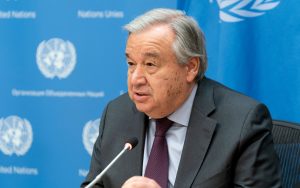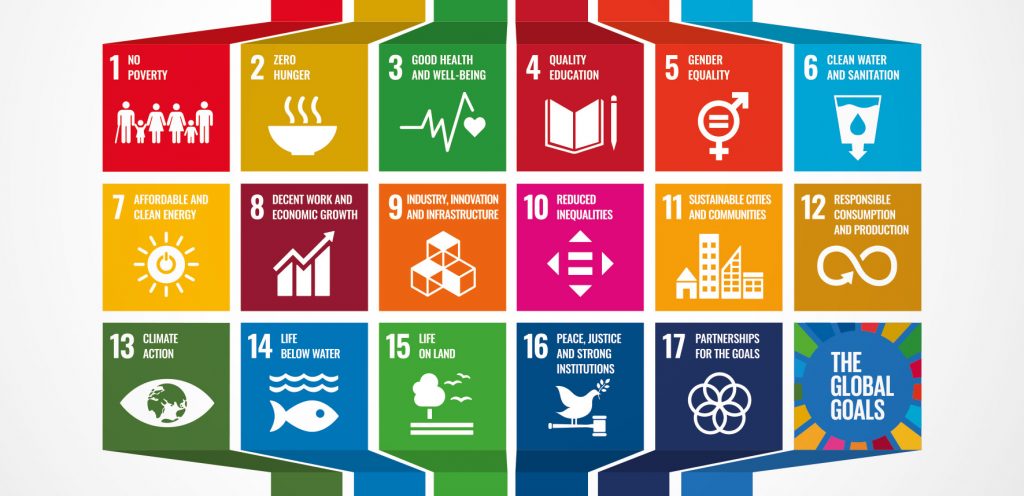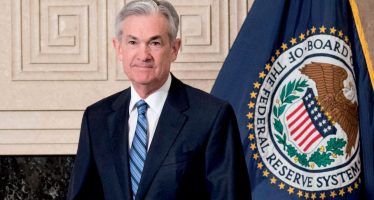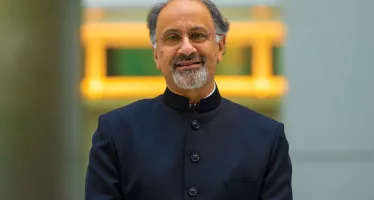António Guterres: SDG Champion

Secretary-General of the United Nations: António Guterres
“The global coronavirus pandemic, which has already caused unimaginable devastation and hardship, has brought our way of life to an almost complete halt,” he said. “The outbreak will have profound and lasting economic and social consequences in every corner of the globe.”
The Secretary-General of the United Nations, António Guterres, certainly seems to agree with Defoe (see below) that the world should now look on things with “differing eyes”.
“Another plague would remove the animosities among us, and bring us to see with differing eyes, than those which we looked on things with before.”
These are the words of Daniel Defoe in A Journal of the Plague Year, a vivid account of life in London in 1665 when bubonic plague wiped out 15 percent of the city’s population, and brought the economy of the whole of England to a standstill.
Many of those who didn’t die, lost their livelihoods, and just as in the global pandemic of 2020, after a period of fear, isolation and hysteria, the great and pressing concern was how to build a better world from the devastation. Defoe’s graphic description of the plague, and the subsequent economic ruin has distinct echoes for our times.
Some economists are forecasting a V-shape recovery; a fast bounce-back. But many more suggest the most likely outcome will be an L-shaped impact – a rapid dip followed by a long period of no significant growth, perhaps continuing for many years.
The United Nations, in its response to the pandemic is perhaps facing the greatest test since its inception in 1945. But the organisation is determined not to be blown off course in its pledge to achieve Sustainable Development Goals (SDGs) by the end of the decade.
The task of finding a way through this world-wide catastrophe has fallen to 71 year old Mr Guterres who became Secretary-General of the UN in 2017 having served two terms as Prime Minister of his native Portugal. The leader of the country’s Socialist Party, he was widely admired at home and abroad for his support for humanitarian causes. He began his career at the UN as High Commissioner for Refugees where he became convinced that sustainable development would be essential for the eradication of poverty and inequality.
Since his appointment as Secretary-General, he has enthusiastically championed the UN’s blueprint of 17 Sustainable Development Goals, which aims to achieve “a better and more sustainable future for all”. These include an end to poverty and hunger, promotion of good health and education, gender equality, clean water provision, clean energy and action on climate change.
This holistic response to the root causes of conflicts – integrating peace, sustainable development and human rights – was going to be challenging enough without an unforeseen global crisis like the Covid-19 virus.
The UN had hoped to achieve their SDG aims by the end of the decade, but the pandemic has thrown a giant spanner in the works, threatening destabilisation in many of the developing countries of the world, most notably in Africa, where progress was being made towards the SDG target.
Mr Guterres, attending a virtual high-level UN the meeting aimed at finding solutions to tackle the damage done by the pandemic to the UN’s 2030 Agenda for Sustainable Development, warned that Covid-19 would cause “unimaginable devastation and suffering around the world”. He predicted that millions would be pushed into extreme poverty, that there would be famines of “historic proportions”, and that we would witness the sharpest contraction of the global economy since the Great Depression of the 1930s.
“Despite all the technological and scientific advances of recent decades, we are in an unprecedented human crisis – because of a microscopic virus,” he said.
He said that there must be immediate, collective action in six crucial areas: Global liquidity and solutions to debt; incentives for creditors; incentives to boost sustainable development; a crackdown on illicit financial dealings; the alignment of incentives in global financial systems with SDGs to boost confidence and relaunch investment in sustainable development; and finally, the creation of an over-arching global framework to aid rapid recovery.
“All our efforts must go towards building sustainable and resilient pathways that enable us not only to beat Covid-19, but to tackle the climate crisis, reduce inequality and eradicate poverty and hunger,” he said.
“Getting through Covid-19 and recovering better will cost money, but the alternative will cost far more. This is a global crisis and it’s up to all of us to solve it. Let us continue to wage peace, defeat the pandemic and build a better future.”
Mr Guterres has been at pains to insist that in the pursuit of sustainable economic recovery world governments must build upon the UN’s SDG blueprint. There was a triple imperative, he told the UN’s Economic and Social Council (ECOSOC) in May, to stem the pandemic, safeguard development gains already made, and ensure that all recovery efforts followed the SDG 2030 Agenda.
“Working together, with our foot on the pedal and our eyes on the (SDG) 2030 Agenda, we will get through this crisis and reach our destination, protecting hard-won development progress and accelerating our joint efforts,” he said. “Our objective remains clear; to help countries navigate and accelerate progress towards achieving the goals.”

One element of the SDGs is gender equality, and Mr Guterres singled out the role of women in the world economy. The pandemic, he said, had laid bare the extent to which national economies are sustained by the unpaid domestic labour of women. He urged governments to tackle the issue in the post-pandemic world to ensure a better recovery. “Returning to our previous path is simply not an option,” he said.
His words were echoed by ECOSOC president, Mona Juul, who said that the pandemic had exposed the disproportionate burden on women who perform unpaid care work and are overrepresented as frontline health workers. She said that the inclusion of a gender perspective, as enshrined in SDG, into social and economic responses to the virus was essential.
Mr Guterres emphasised that bold action taken now, based on the UN’s SDGs, would not only protect the weakest, it would help ensure a stronger recovery. And he again stressed the regularly-quoted phrase that he would “leave no-one behind”. The recovery, he said, had to be focussed on building inclusive and sustainable economies that are more resilient in the face of future global challenges.
At the beginning of the year, the UN announced a “Decade of Action” for SDGs. The conversation at the time was about how to build momentum in the final ten years of the initiative. In its 2019 SDG report, the UN had warned that progress towards the goals was slowing, even reversing in some areas.
Now there are many who paradoxically believe the pandemic, far from being an unanticipated obstacle to SDG progress, may help reinvigorate the project. The UK Stakeholders for Sustainable Development (UKSSD), for instance, pointed to the way many businesses supported communities and the vulnerable during the pandemic, showing a willingness to help society and go above and beyond the normal.
UKSSD blogger, Emily Auckland, said: “It is only by working together that we will create a post-pandemic future that is fairer, just and sustainable.”
Failure to respond quickly at this point in history, said Mr Guterres, could jeopardise progress already made towards achieving SDGs. The UN has drawn attention to several areas where a substantially improved outcome might be achieved because of the effects of the pandemic – one being the question of remittances.
Remittances – the money sent by migrant workers in developed nations to their families in poorer countries – currently account for more than five percent of GDP in as many as 60 low-income countries. During the pandemic, this flow of cash has been dramatically reduced, causing great hardship in developing countries.
But the pandemic has exposed vulnerabilities in the global remittance system, said Gilbert F. Houngbo, president of the UN agency, the International Fund for Agricultural Development (IFAD). He called for an overhaul of money-transfer systems to ensure more of the cash reaches needy families, and less is lost in transfer fees. IFAD is currently in negotiation with financial technology firms, mobile operators, banks and postal networks to find a solution to high transaction costs.
Mr Guterres focussed specifically on the effects upon mental health as a result of the pandemic, especially among the young. “Mental health is at the core of our humanity,” he said. “The virus is not only attacking our physical health, it is also increasing psychological suffering. Throughout my life, and in my own family, I have been close to doctors and psychiatrists treating these conditions. I became acutely aware of the suffering they cause. Even when the pandemic is brought under control, grief and anxiety will continue to affect people and communities.”
His observations were confirmed in late May 2020, when the International Labour Organisation (ILO) warned that more than one in six young people worldwide had lost their jobs due to the coronavirus.
The ILO reported that under 30s had been particularly hard hit, claiming that their financial prospects could be blighted for decades. Guy Ryder, the ILO’s Director-General said that many young people would simply be left behind. Youth unemployment in the EU for instance, which still stands at around 15 percent, had never fully recovered from the financial crisis of 2008, he said.
This was just one aspect of the potential fall-out from the pandemic. Mr Guterres also drew attention to the plight of the world’s developing nations, especially those in Africa, whose progress towards the UN’s SDG targets was being thrown off course as a result of the economic damage caused by coronavirus.
Mr Guterres had earlier called on UN member states to adopt a “war economy” to fight the effects of the virus. Defeating coronavirus, he said, was the first stage, but the world should seize the opportunity to create a global economy which was more “inclusive and sustainable going forward”.
“We need to prepare for a recovery for a better economy, a more sustainable and inclusive economy,” he said. “We don’t need to replicate exactly the economy of the past. Many things will change, I would say irreversibly in our lives.”
He said that the world needed to use the current situation wisely; “to seize it as an opportunity” to achieve more inclusiveness and sustainability in national economies. He also expressed the hope that another effect of the pandemic would be to force governments to re-evaluate relationships with the environment, and redouble efforts to combat climate change.
Unsurprisingly for a man who sees his fundamental role as UN Secretary-General to be the achievement of the eradication of poverty and inequality, Africa is at the heart of his Covid-19 concerns.
As the virus began to spread across the continent, Mr Guterres called on warring factions in several African states to agree to a general ceasefire, in the hope that the pandemic would somehow make peace easier to achieve.
Mr Guterres knows that the pandemic will not be defeated until Africa is safe. Economic instability could lead to catastrophic collapse in the region, leading in turn to more conflict, famine and an upsurge in migration.
“In recent years Africans have done much to advance the well-being of the continent’s people,” he said. “Economic growth has been strong; the digital revolution has taken hold. A free trade area has been agreed. But the epidemic threatens Africa’s progress. It will aggravate long-standing inequalities and heighten hunger, malnutrition and vulnerability to disease.”
It was already the case, he said, that African exports were in serious decline because of coronavirus, and demand in the continent’s tourism industry had all but dried up. The opening of a pan-African trade zone, upon which so much is staked, and which was due to take place in 2020, has been postponed as a direct result of the pandemic.
Mr Guterres praised the way African countries had moved rapidly to establish regional co-operation to fight the spread of the disease, including co-ordinated quarantines and lockdowns. He also commended African governments for drawing on their experience of epidemics like HIV/Aids and Ebola in the fight against rumour and misinformation, debunking anecdotal speculations and overcoming mistrust of government agencies.
But the international community, he argued, had to step in to help strengthen local health systems, and try to avoid a financial crisis which could push millions of Africans into poverty.
Elsewhere, Inger Andersen, the Executive Director of the United Nations Environment Programme (UNEP) shone the spotlight on the effect of the pandemic on environmental issues, insisting that the world’s response must not be seen as simply a philanthropic reaction. Sustainable recovery and development will need to be fully future-proofed, she said. The threat posed by rising global temperatures increases the likelihood of more pandemics, flooding, droughts and the destabilisation of economies.
Meanwhile attention has also been focussed on the generational response to the crisis. Those reaching adulthood in the early 21st century – Millennials and Generation Z – were initially accused of having too carefree an attitude to the virus, even being blamed for helping to spread infection. But it is becoming clear that the response of young people is leading to intergenerational innovation to find ways to survive and grow.
Millennials and Generation Z make up nearly 40 percent of workers in fragile areas such as childcare, restaurants, and tourism – and are bearing the brunt of the economic impact of measures designed to tackle Covid-19. But these young people are also collaborative, comfortable with electronic communication and the use of technology, and above all, adaptable.
They are the generations most likely to seek out sustainable brands, say economists. Unilever, the giant Anglo-Dutch consumer goods company, is a pioneer of in this field. In 2018 their 28 Sustainable Living Brands grew 69 percent faster than the rest of the business – up from 46 percent the previous year. Much of this growth, Unilever believes, is down to the attitudes of younger generations.
Elizabeth Uviebinené, the British author of Slay in You Lane: The Black Girl Bible, summed up this opinion, saying: “Despite the uncertainty ahead, I take comfort in the fact that millennials are a resilient and adaptable generation because we’ve always had to be, and this setback will be no different.”
The Business & Sustainable Development Commission, launched in Davos, Switzerland in 2016, believes that at least $12 trillion could be unlocked through the expansion of sustainable business over the next decade, creating up to 380 million new jobs by 2030.
Elizabeth Boggs Davidsen, the Director of SDG Impact at the United Nations Development Programme (UNDP), says that the pandemic has exposed the world’s weaknesses, and “reminded us about how interconnected all our fortunes are”.
“We now have the opportunity to create a better, stronger, more sustainable, resilient and inclusive future for all,” she says. “Rather than assume that the pandemic makes our task harder, we should capitalise on the opportunity and space it provides to challenge conventional wisdom.”
In 2018, KPMG reported that of the world’s 250 largest companies, only 101 mentioned SDGs in their corporate reporting, and of these, just eight made the business case for SDGS.
Ms Davidsen says: “Too often the SDGs are used as just another reporting lens to communicate existing activities differently, rather than to make different decisions. While interest in the SDGs has been building, business leaders tell us they still do not have all the tools and information they need.”
Her role, as the pandemic recedes, is to build a common business framework to guide companies, creating a greater sense of confidence in an uncertain time, she said.
António Guterres believes that people have finally become conscious of the seriousness of the virus and its effects, and now understand that global solidarity and co-ordination of action was required not only to defeat coronavirus, but also to keep the wheels of the world economy turning.
Despite the apparent chaos in the global response to coronavirus, the conflicting advice of experts, the attempts to pin blame, the rhetoric of leaders like Mr Trump, the failure to follow WHO guidance by some, the opportunistic crackdown on civil liberties by others, Mr Guterres remains optimistic that the world can recover, and a new, equitable future be created.
And it would seem that his cautious optimism is shared. Global Web Index, a London-based consumer research body, believes that optimism is a key factor in navigating the coronavirus crisis – and its extensive market research appears to bear that out.
An internet survey of 14,000 people across 13 countries conducted during the height of the pandemic in March 2020 found a reassuringly high level of optimism for recovery among respondents, though there were significant variations between countries.
China saw the highest levels of optimism at 93 percent, while in Japan only 17 percent were hopeful of a positive outcome. In the USA and UK, there was an approximate 50:50 split between confidence and pessimism. According to Global Web Index, good communication appears to be the key to maintaining consumer optimism, with those who felt well-informed being generally less concerned for the future.
The Great Plague of 1665 was the first time the citizens of England had suffered such pestilence since the dreadful years of the Black Death in the 14th century. It took them by surprise in much the same way as coronavirus shocked a modern world where such events were seen as things of the past. The Black Death wiped out almost 45 per cent of England’s population in the mid-1300s, and in doing so, also obliterated the feudal system, laying the foundation for a modern nation. Similarly, the Great Plague, followed the next year by the Great Fire of London, allowed the city to transform into a progressive capital. From calamity can come hope.
In his journal of the plague year, Daniel Defoe echoes this conviction with a grimly comic observation that there may yet be cause for hopefulness:
“This is a world of corpses strewn in the streets and pits, yet in the deadcart itself a drunken piper wakes up to cry, ‘But I an’t dead tho’ am I?’”
See the article in CFI.co Autumn 2020 issue.

Author: Tony Lennox
You may have an interest in also reading…
Interview with Alexis Lecanuet, Accenture Middle East: Creating Value Through Continuous Transformation
How has your professional journey qualified and prepared you for being the Middle East Region MD for Accenture? As a
Jerome Powell, Chair of the Federal Reserve: The End of Easy Money
It had to happen and it just did. The untold joys of expansive monetary policy as the engine of growth
World Bank: How to Accelerate Growth and Progress in Developing Economies
Amid a barrage of shocks during the past four years, the global economy has proved to be surprisingly resilient. Major















































































